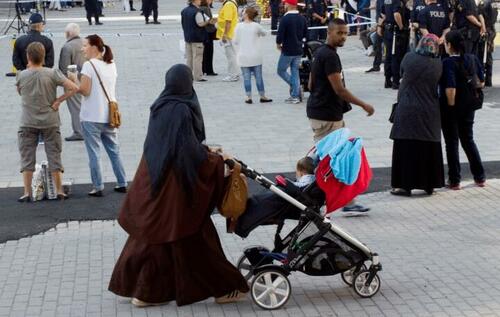'Islam Must Adapt To Sweden' — Swedish Deputy PM Urges Public Burqa, Niqab Ban
Sweden’s Deputy Prime Minister Ebba Busch has called for a nationwide ban on burqas and niqabs in all public places, saying the country must “wake up from its naivety” about Islamism and act decisively to protect Swedish values and social cohesion.
The Christian Democrats (KD) leader told Aftonbladet that she wants legislation prohibiting the full-face coverings in streets, squares, shops, healthcare facilities, and other public settings — a step beyond previous local attempts to ban them in schools and public workplaces that were struck down under current law.
“You should be able to meet for real if you are on the street, if you are shopping in the square, or taking the children to the health center. Then I don’t want to meet someone who has covered their entire face,” Busch said.
She argued that the niqab and burqa are symbols of strict interpretations of Islam seen in totalitarian states, which she described as incompatible with Swedish society.
“Islam must adapt in Sweden. You can be a proud Swedish Muslim, Christian, Jew, or atheist, but there are fundamental Swedish values that must apply to us all,” she said.
Asked to clarify whether her proposal would amount to a ban on wearing the garments outside the home, Busch replied: “Yes, that’s it. We don’t want to see burqas and niqabs out in Swedish public. Then we can’t control, and shouldn’t control, what people do at home. But the burqa doesn’t belong in Sweden and we won’t pave the way for it.”
Busch said critics who accuse politicians of overreach by trying to regulate how people dress are guilty of “very naive liberalism” that has contributed to Sweden’s failed integration policies. She cited estimates that around a quarter of a million young people in Sweden live under conditions similar to honor oppression and said nearly 70,000 women in the country have undergone female genital mutilation.
“It has gone far too far already. It will take a long time to reverse this. Then we also need to keep the issue of niqab and burqa clearly on the agenda and ban it while we can,” she said.
“You are very welcome to be a Muslim in Sweden, but not in the way that Islam is practiced in Iran and Afghanistan. I don’t want to bring more totalitarian Islamists here. They are not welcome here in the future, and you have to adapt if you are already in the country,” Busch said.
Education and Integration Minister Simona Mohamsson, leader of the Liberal Party, expressed support for stronger action against religious oppression, including forced veiling, though she did not explicitly endorse Busch’s proposal.
“Burqa and niqab are oppressive garments that are based on the idea that women should not be visible in public space,” Mohamsson told the Swedish newspaper.
Sweden’s Christian Democrats will vote on Busch’s proposal at their national congress in mid-November.
Busch’s call moves the Swedish government closer to positions long advocated by the Sweden Democrats, who support the minority government through a confidence-and-supply agreement. Their leader, Jimmie Åkesson, has repeatedly called for more radical steps, including the demolition of mosques, to halt what he describes as the Islamization of Sweden.
Such views are increasingly reflected in mainstream political debate across Europe. In the Netherlands, Geert Wilders, leader of the largest party, PVV, has called for a ban on building new mosques, while Spain’s Vox party recently highlighted a doubling in the number of mosques over the last decade, describing it as evidence of a “suicidal migration policy” that must be reversed.
Across the continent, a number of countries have already adopted restrictions on face-covering garments in public spaces.
France passed the first such national ban in 2010, followed by Belgium (2011), Austria (2017), Denmark (2018), and most recently Switzerland (2025). Others, including the Netherlands and Bulgaria, have enacted partial or local bans.
Last week, Italian Prime Minister Giorgia Meloni’s Brothers of Italy (FdI) party announced plans to introduce a similar measure.
“Religious freedom is sacred, but it must be exercised in the open, in full respect of our constitution and the principles of the Italian state,” said FdI MP Andrea Delmastro, one proposer of a new bill to address the issue.



